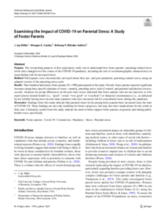This page contains documents and other resources related to children's care in the Americas. Browse resources by region, country, or category.
Displaying 661 - 670 of 3191
This article from Time shares the stories of families who were separated at the U.S. border with Mexico who are now receiving free mental health services to address the trauma of family separation, as a result of a court order that requires the U.S. government to pay for it.
Child Welfare: Preparing Social Workers for Practice in the Field is a comprehensive text for child welfare courses taught from a social work perspective. This textbook provides a single source for all material necessary for a contextual child welfare course.
Using survey data provided on youths’ social networks, this study identified 378 informal mentoring relationships provided to 113 former and current foster youth preparing to enter a four-year university.
This article from ABC News describes some of the impacts of the COVID-19 pandemic on children in foster care in the United States.
The present study examined how emotional abuse and emotional neglect-exposure in adolescence uniquely related to psychological symptoms and social impairment.
This research focused on a U.S. statewide program that uses team decision-making meetings to identify needs and plan services for youth who are at risk for instability while in foster care.
This paper documents the alignment between the circumstances created by anti-Black racism at institutional, provincial, and federal levels and the seemingly race-neutral eligibility criteria embedded within Ontario child welfare, which results in disproportionate reporting of Black families.
The overarching purpose of this exploratory study was to understand how foster parents’ parenting-related stress levels have changed over the course of the COVID-19 pandemic, including the role of sociodemographic characteristics in exacerbating risk for increased stress.
The current study is the first to explore the prevalence of reproductive coercion among adolescent women currently or previously involved in the U.S. foster care system.
El propósito de este contrato es profundizar sobre el análisis de la situación de las modalidades de cuidados ofrecidos por los Estados en América Latina y el Caribe con un enfoque en la comunidad y la familia, con un especial énfasis en la atención a la niñez en contextos de movilidad humana y en otros contextos altamente vulnerables, con especial atención a las niñas y adolescentes mujeres.


